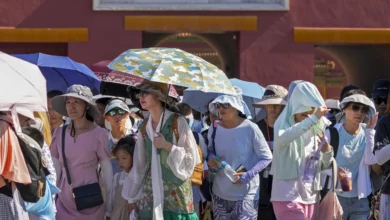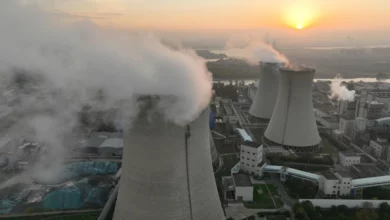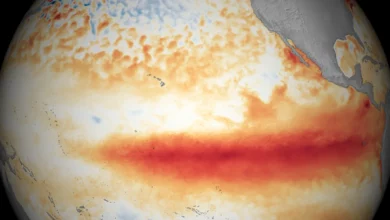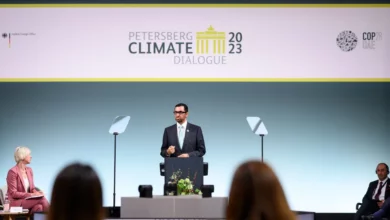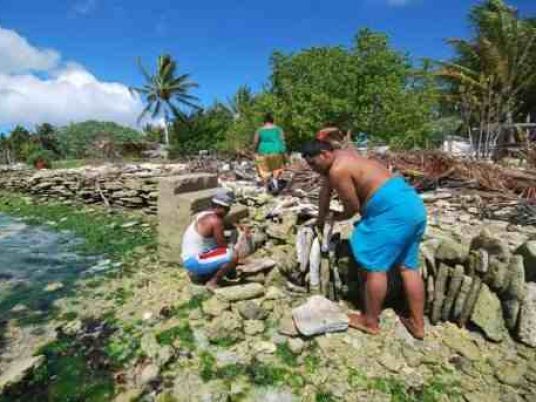
Giant floating islands, castle-like sea walls and mass migration are among some of the "crazy" plans the leader of Kiribati has to save his low-lying Pacific nation from global warming-induced oblivion.
Scientists warn rising sea levels caused by climate change will submerge many islands around the world and the 33 of Kiribati, barely two metres (6.5 feet) above sea level, could be among the first.
Kiribati President Anote Tong is in Paris this week to try to convince negotiators at a UN conference who are aiming to forge an historic pact to tame global warming that they must unite behind the best possible deal.
But, fearing powerful nations will continue rampant coal burning and other activities that release heat-trapping greenhouse gases, Tong is preparing for the worst.
"I'm sure you think I'm crazy, but we've got a crazy situation," Tong told AFP in an exclusive interview on the sidelines of the conference, as he outlined some of the contingency plans for Kiribati's 100,000 people.
"These kinds of events have never happened before, we are a country under serious threat. The strategies I've been advocating are somewhat radical, but I assure you they are not. They are as realistic as we can make them."
'Radical, unprecedented'
Among those strategies is the construction of floating islands, anchored to the sea, that could sustain up to 30,000 people for a century.
Engineers from a major Japanese construction company have travelled to the remote islands, which lie about halfway between Australia and Hawaii, to promote their seemingly science-fiction concept.
"The question is: do we have any other options," Tong responded when asked if creating the world's first floating nation was a serious proposal.
"It's radical, unprecedented, way out of the box, but in the absence of other options, unless you can come up with alternatives, I'm afraid that these are the options available to us."
In reality, the floating islands — complete with skyscrapers and resort facilities — would cost hundreds of billions of dollars, and Tong understands they will not become reality anytime soon, if at all.
For quicker and less expensive alternatives, Tong has reached out to experts from the Netherlands, United Arab Emirates and South Korea for help in fortifying the existing islands against the sea's inexorable rise.
Among the options are constructing sea walls, as well as "land reclamation" and the building of artificial islands using sand dredged from the seabed.
"Our people cannot live on water, we have to stay above the water," Tong said.
But even those options cost hundreds of millions of dollars, impossibly expensive without outside help for a nation with annual economic output of about $200 million.
Flee or perish
So Tong is also pushing ahead with a plan of "migration with dignity", training his people who mostly have lived simple fishing lifestyles.
"We need to get them prepared, educated, qualified to international standards, so they can begin the process of moving today, as a matter of choice, not to be struggling at the last moment to be getting out," he said.
Tong said "king tides" were already regularly inundating the islands, destroying precious farmlands and forcing people to move to higher areas inland.
Kiribati has bought 2,000 hectares (5,000 acres) of farmland in Fiji, a bigger Pacific Island nation, to ensure its food supplies are maintained and possibly become a new home.
Rising sea levels are caused by glaciers and ice sheets melting as the world warms. This is occurring largely because greenhouse gas emissions are being emitted from the burning of coal, oil and gas.
Tong said another, even more urgent concern, was the changing weather patterns of global warming that had in recent years begun to bring unprecedented major storms to Kiribati.
In an earlier briefing to climate campaigners in Paris, Tong talked at length about Cyclone Pam, one of the strongest storms ever in the South Pacific which hit in March with winds of 250 kilometres (155 miles) an hour.
"Our islands are not structured to withstand the storms, we don't have any higher ground. We only have very narrow strips of land. During Cyclone Pam, the waves came over half the southern islands," he said.
Tong's messages to nations negotiating in Paris, many of whom are reluctant to move away from fossil fuels, are laced with appeals to morality.
"We must never ever allow ourselves as a species, to leave anyone behind," he told AFP.

